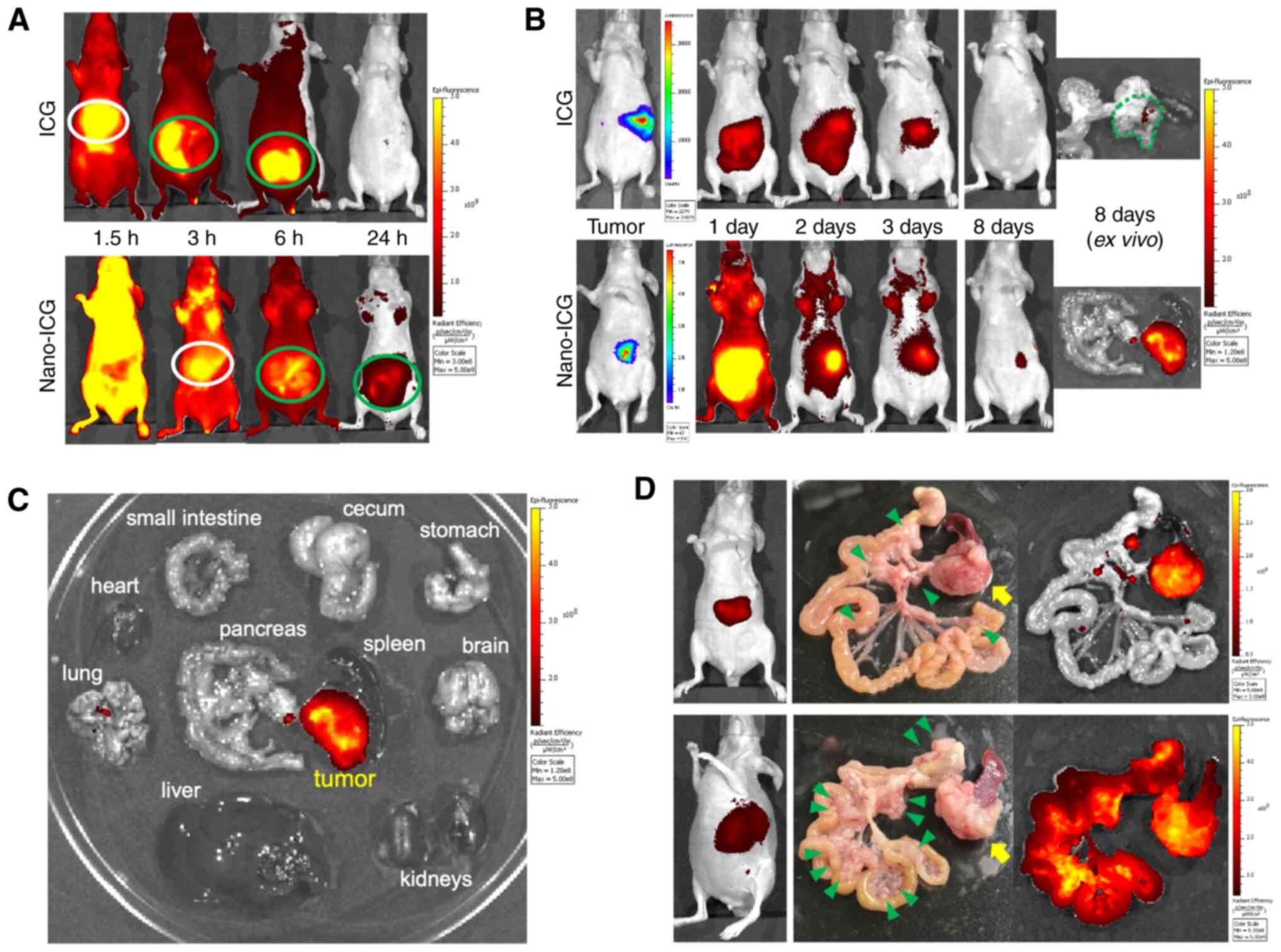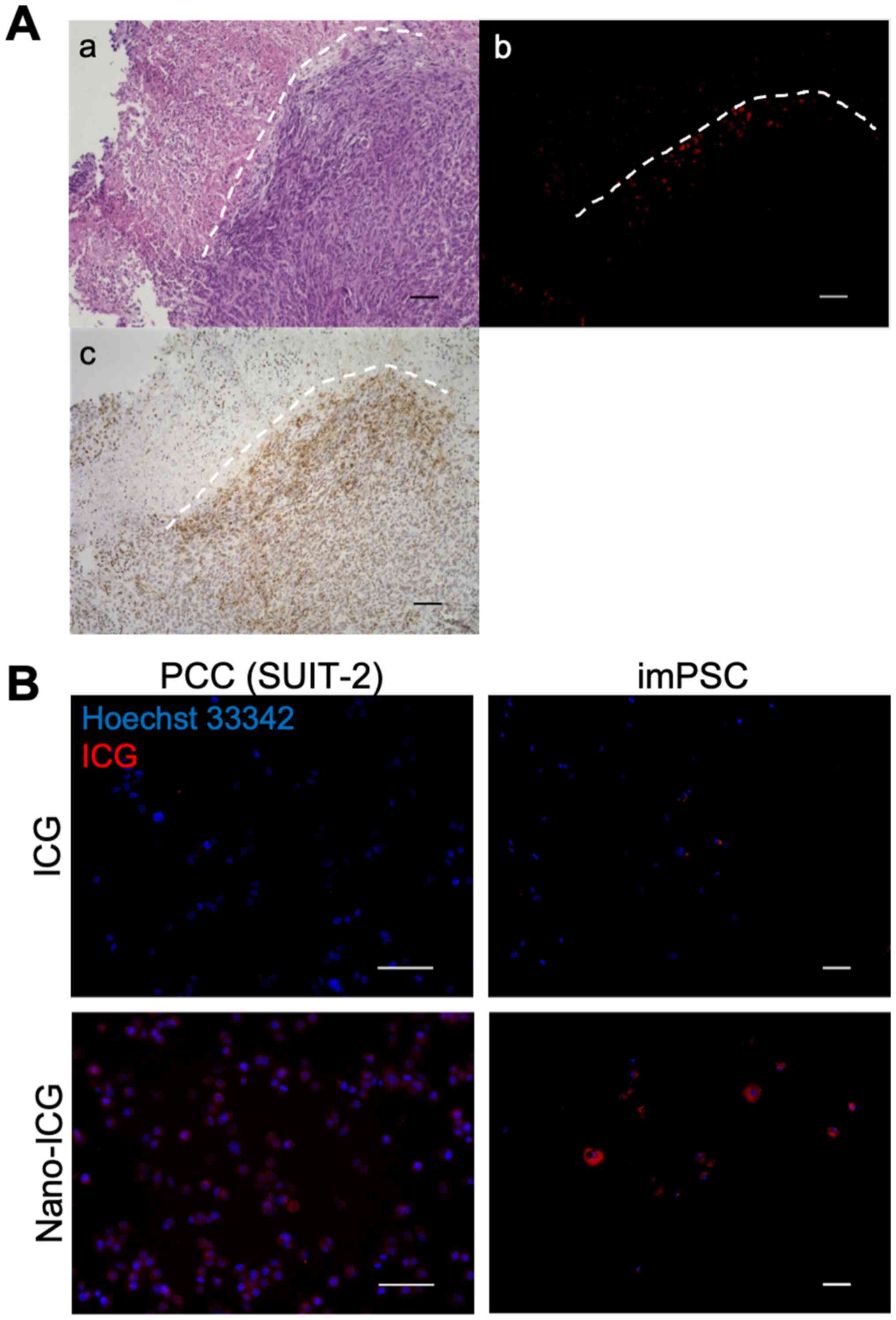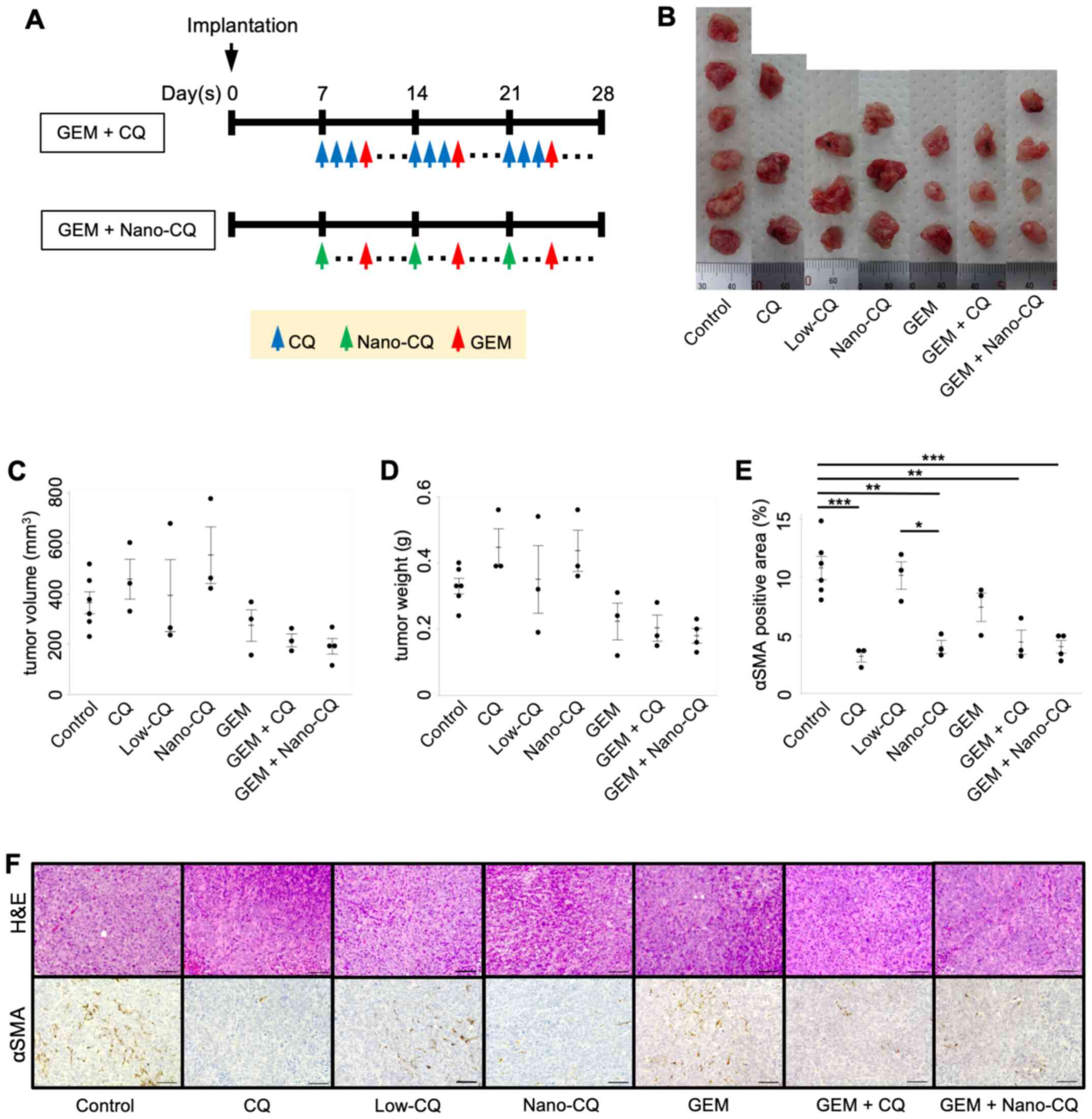|
1
|
Everett JN and Simeone DM: Pancreatic
cancer. World cancer report: Cancer Research for Cancer Prevention.
Wild CP, Weiderpass E and Stewart BW: International Agency for
Research on Cancer; Lyon: pp. 367–373. 2020
|
|
2
|
Siegel RL, Miller KD and Jemal A: Cancer
statistics, 2019. CA Cancer J Clin. 69:7–34. 2019. View Article : Google Scholar : PubMed/NCBI
|
|
3
|
Neoptolemos JP, Kleeff J, Michl P,
Costello E, Greenhalf W and Palmer DH: Therapeutic developments in
pancreatic cancer: Current and future perspectives. Nat Rev
Gastroenterol Hepatol. 15:333–348. 2018. View Article : Google Scholar : PubMed/NCBI
|
|
4
|
Aslan M, Shahbazi R, Ulubayram K and
Ozpolat B: Targeted therapies for pancreatic cancer and hurdles
ahead. Anticancer Res. 38:6591–6606. 2018. View Article : Google Scholar : PubMed/NCBI
|
|
5
|
Hosein AN, Brekken RA and Maitra A:
Pancreatic cancer stroma: An update on therapeutic targeting
strategies. Nat Rev Gastroenterol Hepatol. 17:487–505. 2020.
View Article : Google Scholar : PubMed/NCBI
|
|
6
|
Tanaka HY and Kano MR: Stromal barriers to
nanomedicine penetration in the pancreatic tumor microenvironment.
Cancer Sci. 109:2085–2092. 2018. View Article : Google Scholar : PubMed/NCBI
|
|
7
|
Bachem MG, Schünemann M, Ramadani M, Siech
M, Beger H, Buck A, Zhou S, Schmid-Kotsas A and Adler G: Pancreatic
carcinoma cells induce fibrosis by stimulating proliferation and
matrix synthesis of stellate cells. Gastroenterology. 128:907–921.
2005. View Article : Google Scholar : PubMed/NCBI
|
|
8
|
Endo S, Nakata K, Ohuchida K, Takesue S,
Nakayama H, Abe T, Koikawa K, Okumura T, Sada M, Horioka K, et al:
Autophagy is required for activation of pancreatic stellate cells,
associated with pancreatic cancer progression and promotes growth
of pancreatic tumors in mice. Gastroenterology. 152:1492–1506.e24.
2017. View Article : Google Scholar : PubMed/NCBI
|
|
9
|
Monma H, Iida Y, Moritani T, Okimoto T,
Tanino R, Tajima Y and Harada M: Chloroquine augments TRAIL-induced
apoptosis and induces G2/M phase arrest in human pancreatic cancer
cells. PLoS One. 13:e01939902018. View Article : Google Scholar : PubMed/NCBI
|
|
10
|
Molejon MI, Swayden M, Fanale D, Bintz J,
Gayet O, Soubeyran P and Iovanna J: Chloroquine plays a
cell-dependent role in the response to treatment of pancreatic
adenocarcinoma. Oncotarget. 9:30837–30846. 2018. View Article : Google Scholar : PubMed/NCBI
|
|
11
|
Balic A, Sørensen MD, Trabulo SM, Sainz B
Jr, Cioffi M, Vieira CR, Miranda-Lorenzo I, Hidalgo M, Kleeff J,
Erkan M, et al: Chloroquine targets pancreatic cancer stem cells
via inhibition of CXCR4 and hedgehog signaling. Mol Cancer Ther.
13:1758–1771. 2014. View Article : Google Scholar : PubMed/NCBI
|
|
12
|
Pascolo S: Time to use a dose of
Chloroquine as an adjuvant to anti-cancer chemotherapies. Eur J
Pharmacol. 771:139–144. 2016. View Article : Google Scholar : PubMed/NCBI
|
|
13
|
Marmor MF, Kellner U, Lai TYY, Melles RB
and Mieler WF; American Academy of Ophthalmology, : Recommendations
on screening for chloroquine and hydroxychloroquine retinopathy
(2016 Revision). Ophthalmology. 123:1386–1394. 2016. View Article : Google Scholar : PubMed/NCBI
|
|
14
|
Chatre C, Roubille F, Vernhet H, Jorgensen
C and Pers YM: Cardiac complications attributed to chloroquine and
hydroxychloroquine: A systematic review of the literature. Drug
Saf. 41:919–931. 2018. View Article : Google Scholar : PubMed/NCBI
|
|
15
|
Shi J, Kantoff PW, Wooster R and Farokhzad
OC: Cancer nanomedicine: Progress, challenges and opportunities.
Nat Rev Cancer. 17:20–37. 2017. View Article : Google Scholar : PubMed/NCBI
|
|
16
|
Matsumura Y and Maeda H: A new concept for
macromolecular therapeutics in cancer chemotherapy: Mechanism of
tumoritropic accumulation of proteins and the antitumor agent
smancs. Cancer Res. 46:6387–6392. 1986.PubMed/NCBI
|
|
17
|
Maeda H, Nakamura H and Fang J: The EPR
effect for macromolecular drug delivery to solid tumors:
Improvement of tumor uptake, lowering of systemic toxicity, and
distinct tumor imaging in vivo. Adv Drug Deliv Rev. 65:71–79. 2013.
View Article : Google Scholar : PubMed/NCBI
|
|
18
|
Danhier F, Ansorena E, Silva JM, Coco R,
Le Breton A and Préat V: PLGA-based nanoparticles: An overview of
biomedical applications. J Control Release. 161:505–522. 2012.
View Article : Google Scholar : PubMed/NCBI
|
|
19
|
Ding D and Zhu Q: Recent advances of PLGA
micro/nanoparticles for the delivery of biomacromolecular
therapeutics. Mater Sci Eng C. 92:1041–1060. 2018. View Article : Google Scholar : PubMed/NCBI
|
|
20
|
Ikenaga N, Ohuchida K, Mizumoto K, Cui L,
Kayashima T, Morimatsu K, Moriyama T, Nakata K, Fujita H and Tanaka
M: CD10+ pancreatic stellate cells enhance the
progression of pancreatic cancer. Gastroenterology. 139:1041–1051,
1051.e1-1051.e8. 2010. View Article : Google Scholar : PubMed/NCBI
|
|
21
|
Kozono S, Ohuchida K, Eguchi D, Ikenaga N,
Fujiwara K, Cui L, Mizumoto K and Tanaka M: Pirfenidone inhibits
pancreatic cancer desmoplasia by regulating stellate cells. Cancer
Res. 73:2345–2356. 2013. View Article : Google Scholar : PubMed/NCBI
|
|
22
|
Ohuchida K, Mizumoto K, Murakami M, Qian
LW, Sato N, Nagai E, Matsumoto K, Nakamura T and Tanaka M:
Radiation to stromal fibroblasts increases invasiveness of
pancreatic cancer cells through tumor-stromal interactions. Cancer
Res. 64:3215–3222. 2004. View Article : Google Scholar : PubMed/NCBI
|
|
23
|
Kawai S, Takagi Y, Kaneko S and Kurosawa
T: Effect of three types of mixed anesthetic agents alternate to
ketamine in mice. Exp Anim. 60:481–487. 2011. View Article : Google Scholar : PubMed/NCBI
|
|
24
|
Cherrick GR, Stein SW, Leevy CM and
Davidson CS: Indocyanine green: Observations on its physical
properties, plasma decay, and hepatic extraction. J Clin Invest.
39:592–600. 1960. View Article : Google Scholar : PubMed/NCBI
|
|
25
|
Desmettre T, Devoisselle JM and Mordon S:
Fluorescence properties and metabolic features of indocyanine green
(ICG) as related to angiography. Surv Ophthalmol. 45:15–27. 2000.
View Article : Google Scholar : PubMed/NCBI
|
|
26
|
Zhang G, Liu F, Zhang B, He Y, Luo J and
Bai J: Imaging of pharmacokinetic rates of indocyanine green in
mouse liver with a hybrid fluorescence molecular tomography/x-ray
computed tomography system. J Biomed Opt. 18:0405052013. View Article : Google Scholar : PubMed/NCBI
|
|
27
|
Qi B, Crawford AJ, Wojtynek NE, Holmes MB,
Souchek JJ, Almeida-Porada G, Ly QP, Cohen SM, Hollingsworth MA and
Mohs AM: Indocyanine green loaded hyaluronan-derived nanoparticles
for fluorescence-enhanced surgical imaging of pancreatic cancer.
Nanomedicine. 14:769–780. 2018. View Article : Google Scholar : PubMed/NCBI
|
|
28
|
Acharya S and Sahoo SK: PLGA nanoparticles
containing various anticancer agents and tumour delivery by EPR
effect. Adv Drug Deliv Rev. 63:170–183. 2011. View Article : Google Scholar : PubMed/NCBI
|
|
29
|
Wang T, Yang S, Petrenko VA and Torchilin
VP: Cytoplasmic delivery of liposomes into MCF-7 breast cancer
cells mediated by cell-specific phage fusion coat protein. Mol
Pharm. 7:1149–1158. 2010. View Article : Google Scholar : PubMed/NCBI
|
|
30
|
Wu ST, Fowler AJ, Garmon CB, Fessler AB,
Ogle JD, Grover KR, Allen BC, Williams CD, Zhou R, Yazdanifar M, et
al: Treatment of pancreatic ductal adenocarcinoma with tumor
antigen specific-targeted delivery of paclitaxel loaded PLGA
nanoparticles. BMC Cancer. 18:4572018. View Article : Google Scholar : PubMed/NCBI
|
|
31
|
Katsuki S, Matoba T, Koga JI, Nakano K and
Egashira K: Anti-inflammatory nanomedicine for cardiovascular
disease. Front Cardiovasc Med. 4:872017. View Article : Google Scholar : PubMed/NCBI
|
|
32
|
Ikenaga N, Ohuchida K, Mizumoto K, Akagawa
S, Fujiwara K, Eguchi D, Kozono S, Ohtsuka T, Takahata S and Tanaka
M: Pancreatic cancer cells enhance the ability of collagen
internalization during epithelial-mesenchymal transition. PLoS One.
7:e404342012. View Article : Google Scholar : PubMed/NCBI
|
|
33
|
Hessmann E, Patzak MS, Klein L, Chen N,
Kari V, Ramu I, Bapiro TE, Frese KK, Gopinathan A, Richards FM, et
al: Fibroblast drug scavenging increases intratumoural gemcitabine
accumulation in murine pancreas cancer. Gut. 67:497–507. 2018.
View Article : Google Scholar : PubMed/NCBI
|
|
34
|
Libutti SK, Tamarkin L and Nilubol N:
Targeting the invincible barrier for drug delivery in solid
cancers: Interstitial fluid pressure. Oncotarget. 9:35723–35725.
2018. View Article : Google Scholar : PubMed/NCBI
|
|
35
|
Chauhan VP, Stylianopoulos T, Boucher Y
and Jain RK: Delivery of molecular and nanoscale medicine to
tumors: Transport barriers and strategies. Annu Rev Chem Biomol
Eng. 2:281–298. 2011. View Article : Google Scholar : PubMed/NCBI
|
|
36
|
Meng H and Nel AE: Use of nano engineered
approaches to overcome the stromal barrier in pancreatic cancer.
Adv Drug Deliv Rev. 130:50–57. 2018. View Article : Google Scholar : PubMed/NCBI
|
|
37
|
Pelt J, Busatto S, Ferrari M, Thompson EA,
Mody K and Wolfram J: Chloroquine and nanoparticle drug delivery: A
promising combination. Pharmacol Ther. 191:43–49. 2018. View Article : Google Scholar : PubMed/NCBI
|
|
38
|
Bynigeri RR, Jakkampudi A, Jangala R,
Subramanyam C, Sasikala M, Rao GV, Reddy DN and Talukdar R:
Pancreatic stellate cell: Pandora's box for pancreatic disease
biology. World J Gastroenterol. 23:382–405. 2017. View Article : Google Scholar : PubMed/NCBI
|
|
39
|
Apte MV, Park S, Phillips PA, Santucci N,
Goldstein D, Kumar RK, Ramm GA, Buchler M, Friess H, McCarroll JA,
et al: Desmoplastic reaction in pancreatic cancer: Role of
pancreatic stellate cells. Pancreas. 29:179–187. 2004. View Article : Google Scholar : PubMed/NCBI
|
|
40
|
Maeda H: Nitroglycerin enhances vascular
blood flow and drug delivery in hypoxic tumor tissues: Analogy
between angina pectoris and solid tumors and enhancement of the EPR
effect. J Control Release. 142:296–298. 2010. View Article : Google Scholar : PubMed/NCBI
|
|
41
|
Seki T, Fang J and Maeda H: Enhanced
delivery of macromolecular antitumor drugs to tumors by
nitroglycerin application. Cancer Sci. 100:2426–2430. 2009.
View Article : Google Scholar : PubMed/NCBI
|
|
42
|
Suzuki M, Hori K, Abe I, Saito S and Sato
H: A new approach to cancer chemotherapy: Selective enhancement of
tumor blood flow with angiotensin II. J Natl Cancer Inst.
67:663–669. 1981.PubMed/NCBI
|
|
43
|
Li CJ, Miyamoto Y, Kojima Y and Maeda H:
Augmentation of tumour delivery of macromolecular drugs with
reduced bone marrow delivery by elevating blood pressure. Br J
Cancer. 67:975–980. 1993. View Article : Google Scholar : PubMed/NCBI
|
|
44
|
Science Council of Japan, . No: 2 Expanded
Committee on Establishment of Guidelines for Proper Conduct of
Animal Experiments. Guidelines for Proper Conduct of Animal
Experiments. http://www.scj.go.jp/en/animal/June 1–2006
|
|
45
|
National Research Council (US) Committee
for the Update of the Guide for the Care and Use of Laboratory
Animals, . Guide for the Care and Use of Laboratory Animals. 8th
edition. National Academies Press; Washington, DC: 2011
|

















